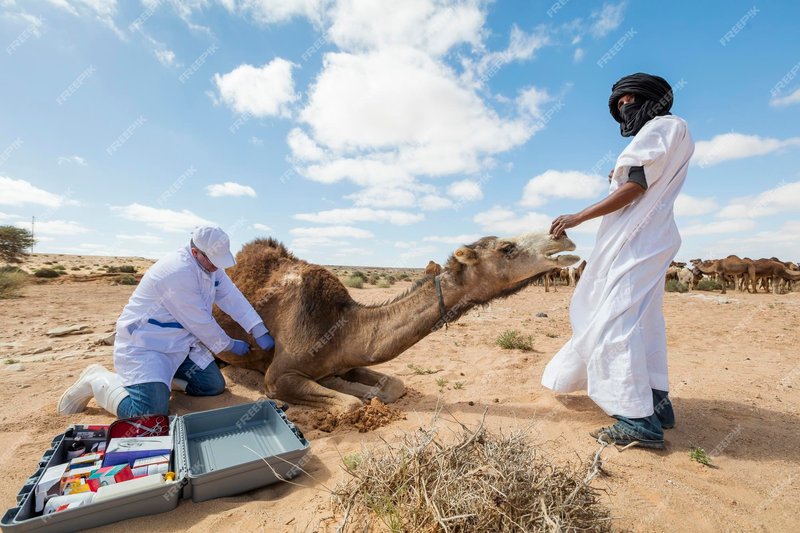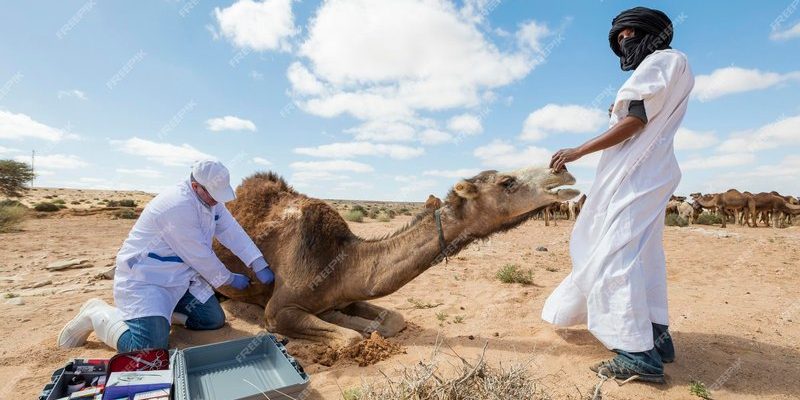
With that in mind, let’s delve into the common health issues that impact camels, and explore some practical tips for veterinary care. This information isn’t just for camel owners; it’s useful for anyone who loves these fascinating creatures or wants to learn more about their care.
Common Digestive Disorders in Camels
Camels are known for their unique digestive systems, which allow them to efficiently process tough vegetation and survive in harsh environments. However, they can suffer from a variety of digestive issues that may lead to more serious health problems.
One common digestive disorder is bloat, which can occur when gas builds up in the stomach. This can happen if a camel eats too quickly or consumes too much fibrous material. Symptoms of bloat include a distended abdomen and signs of discomfort. If you notice these signs, seek veterinary help immediately.
Another issue is laminitis, which is an inflammation of the hoof’s sensitive tissue and can happen due to a diet that’s too high in carbohydrates. Providing a balanced diet and ensuring camels have ample roughage can help prevent these issues.
Recognizing the Symptoms
It’s essential to understand the signs of digestive disorders in camels. Look out for:
- Changes in eating habits
- Signs of pain, like restlessness or pawing at the ground
- Abdominal swelling
- Dehydration or abnormal bowel movements
Being proactive about your camel’s eating habits can prevent many problems. If anything seems off, don’t hesitate to consult with a veterinarian who specializes in camel care.
Respiratory Issues in Camels
Respiratory problems can arise from various sources, such as poor air quality, infections, or allergies. One of the most common conditions is pneumonia, which can deeply impact a camel’s health if not treated promptly.
Camels can be particularly sensitive to dust and molds found in their environment. If you keep your camel in a barn or stable, make sure it’s well-ventilated and that bedding is regularly cleaned and changed.
Signs of Respiratory Problems
Watch for these symptoms that might indicate respiratory issues:
- Coughing or sneezing
- Nasal discharge
- Labored breathing
- Fever or lethargy
If your camel shows any of these symptoms, it’s time to get help. A veterinarian can perform tests and suggest treatments to keep your camel’s lungs in good shape.
Skin Conditions and Parasite Infestations
Just like humans, camels can develop skin issues, which can often be linked to parasites. Common parasites include mites, ticks, and worms. These can lead to skin irritation and infections.
Regular grooming is crucial not just for keeping your camel looking neat but also for checking for signs of parasites. If you find any unusual bumps or irritations on the skin, consult your vet for appropriate treatments.
Preventative Measures
Here are some tips to help prevent skin conditions and parasite infestations:
- Maintain a clean living environment
- Regularly groom your camel
- Administer regular deworming treatments as recommended by your vet
- Keep an eye out for changes in behavior, which may indicate discomfort
Paying close attention to your camel’s skin health will go a long way in preventing infections and ensuring its well-being.
Watering and Hydration Issues
Hydration plays a vital role in a camel’s health. Being resilient creatures, camels can endure extended periods without water; however, they do need access to clean, fresh water regularly. Dehydration can lead to severe consequences, such as organ failure.
In some climates, water sources may become limited or contaminated. Be sure to monitor how much water your camel consumes and make adjustments as necessary.
Signs of Dehydration
Knowing the signs of dehydration is crucial. Here are some indicators you might observe:
- Dry mouth or gums
- Sunken eyes
- Loss of skin elasticity
- Fatigue or lethargy
If you suspect dehydration, it’s crucial to offer your camel water and consult a vet for further guidance.
Importance of Regular Veterinary Check-Ups
Just like we visit the doctor for routine check-ups, camels need regular veterinary care too. Having a vet who specializes in camel care is invaluable. They can help monitor health, provide vaccinations, and catch potential issues before they become serious.
A good rule of thumb is to schedule a check-up at least once a year. During these visits, the vet can assess your camel’s overall health, check for parasites, and provide personalized care advice based on your camel’s specific needs.
Preparing for the Vet Visit
When preparing for a vet visit, here are some tips:
- Keep a record of your camel’s health history, including any past issues.
- Note down any changes in behavior, eating habits, or physical condition.
- Prepare a list of questions for your vet, so you can get the most out of your appointment.
Knowing how to prepare will not only make the process smoother but also help in addressing your camel’s health effectively.
Nutrition and Diet Management
A balanced diet is fundamental to a healthy camel. Camels are herbivores and require specific nutrients to thrive. Their diet should primarily consist of hay, grasses, and other fibrous plants. Avoid feeding them too many grains or treats, as this can lead to digestive issues.
Besides just watching what they eat, it’s essential to consider how often they eat. Camels like to graze throughout the day, so providing them with access to food over several hours is ideal.
Feeding Guidelines
Here are some feeding tips to keep your camel healthy:
- Provide plenty of roughage, like hay and grasses.
- Avoid sudden dietary changes, as this can upset their digestive system.
- Consider supplementing with minerals and vitamins if recommended by your vet.
- Ensure fresh water is available at all times.
Being mindful of your camel’s nutrition can help prevent many health problems down the line.
In conclusion, keeping your camel healthy involves a mix of awareness, preventive care, and timely veterinary support. By understanding common health issues and following these care tips, you can ensure your camel remains in great shape. Remember, these magnificent creatures deserve the best care possible, and your efforts will lead to a happier, healthier life for them.

